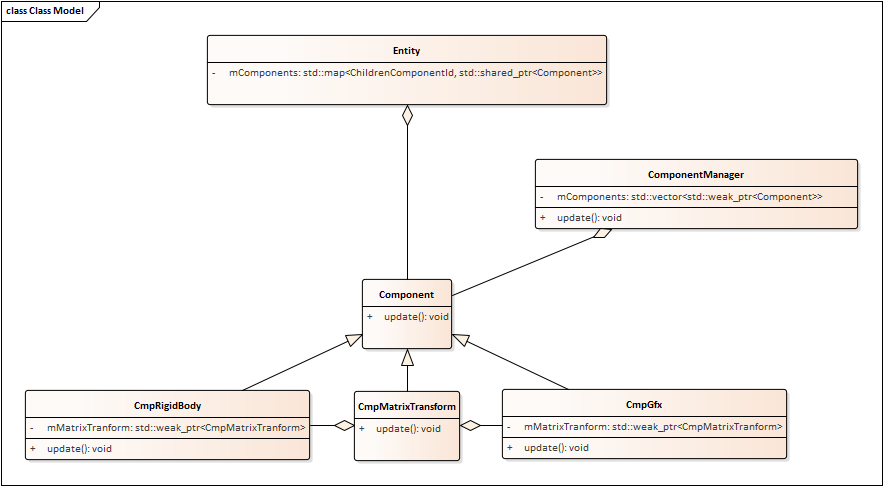We've built an entity-component architecture that works ok for our needs, but it has something that bugs me a bit from a software engineering point of view.
We use std::shared_ptr and std::weak_ptr for the Components: the Entity owns the component through an std::shared_ptr, while the ComponentManager and other Components refer to the component through a non-owning std::weak_ptr.
The issue is that the components are not actually shared, and they should not be shared either. They're owned by a single entity. Having an std::shared_ptr there suggests that anyone can take a copy of the shared_ptr and own it too.
Here is a diagram of how the classes are organized:
Entity:
- real owner of the components through
shared_ptr - does not know which components it holds
ComponentManager:
- we call
update()on theComponentManager, which in turn callsupdate()on every component it knows about - there is one instance per type of component; we've done it like this to have control over which components get updated first (e.g.
CmpRigidBodyupdates theCmpMatrixTransform, and from which theCmpGfxis then updated) - unofficial owners of the components through
weak_ptrs; it's "unofficial" because it's through them that the components are updated weak_ptrs are stored in avector- once the (single)
shared_ptrgoes out of scope (e.g. when the entity gets deleted), a custom deleter tells the ComponentManager to remove theweak_ptrfrom thevector(this also adds confusion to this architecture)
Component and derived:
- holds the core of the information and performs the main operations of the component
- can reference other components through
weak_ptr(hooked up at initialization, for now)
I strongly believe in using the right tool for the job, and although this architecture works, I'm curious to see if there are alternatives that would remove the confusion introduced by the shared_ptrs.
Maybe this is pertinent:
- The amount of entities and components is relatively low, so we won't gain much by making efforts to keep them close together (the rendering and the physics simulation are taking most of our frame time).
- We use this approach because of the re-usability offered by the components and entities from project to project.
- The project is single-threaded.
- The action takes place in the
Component, not in theComponentManager(i.e. it's a entity-component architecture, not an entity-component-system archiecture), so theComponentneeds access to otherComponents if they still exist, and these can be removed at any time.
I could use a kind of handle system through the ComponentManager and query the appropriate one every time I need an access to a Component, but this adds a dependency... (Maybe that's the price to pay..?!)
Do I have other options?

